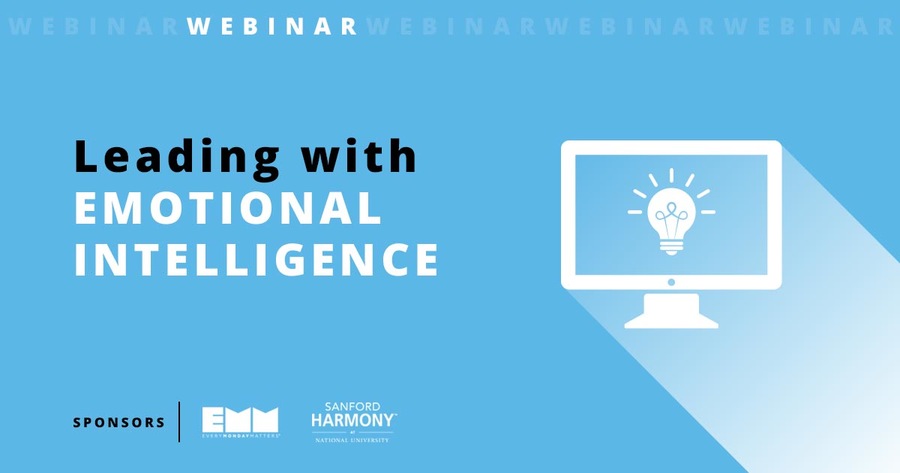Because of their influence on the overall work environment and the professional development of others, it's essential that leaders understand and develop their own social and emotional competencies. In this recap of the webinar "Leading with Emotional Intelligence," presented by Jimena Quiroga Hopkins, Development Without Limits, you'll learn a bit about what emotional intelligence is before assessing your own EQ. You'll also learn about strategies and next steps for personal and professional growth.
What is emotional intelligence and why is it so critical that leaders work on this area?
Emotional Intelligence, also referred to as EI or EQ, is the capability of individuals to recognize their own emotions and those of others, discern between different feelings and label them appropriately, use emotional information to guide thinking and behavior, and manage and/or adjust emotions to adapt to environments or achieve one's goals.
"Many of us are very focused on SEL and ensuring that we're implementing SEL in our programming and that's really about ensuring young people increase their emotional intelligence," said Quiroga Hopkins, who cites Daniel Goleman's book, Emotional Intelligence for much of the information in the webinar. "As we're doing that, it only makes sense that we as leaders are also working on our own emotional intelligence. This really is a lifelong process."
5 Elements of Emotional Intelligence
What are they and what do they mean in terms of the work done in the afterschool space?
Self-Awareness: Recognizing and labeling one's feelings and accurately assessing one's strengths and limitations.
Self-Management: Regulating emotions, delaying gratifications, managing stress, motivating oneself, and setting and working toward achieving goals.
Social Awareness: Showing empathy, taking others' perspectives, and recognizing and mobilizing diverse and available supports.
Motivation: Our personal drive to improve and achieve, commitment to our goals, initiative, or readiness to act on opportunities, as well as optimism and resilience.
Relationship Skills: Clear communication, accurate listening, cooperation, nonviolent and constructive conflict resolution, and knowing when and how to be a good team player and leader.
In leadership, before you can lead anybody else you have to be able to lead yourself.
"Things have really shifted in the field—we're paying a lot more attention to this subject. But overall, I still feel like we could be paying even more attention to EQ, especially as adults," said Quiroga Hopkins, who shared research which has shown that EQ is the strongest predictor of work performance, accounting for 58% success in all fields. "It's not as common to see top performers in the workplace who are not also high in emotional intelligence."
How do we cultivate emotional intelligence within our own leadership styles?
Primal Leadership: The emotional dimension of leadership.
"The framework is really built around the idea that good leaders create resonance," said Quiroga Hopkins. "Resonant leaders have a high degree of emotional intelligence and a greater ability to connect personally to whoever they're working with. They show genuine empathy, are more likely to create harmony and are able to stay balanced in tense situations."
Versus a dissonant leader, who has a greater disconnect with their team and doesn't know much about them personally.
Webinar participants took the time to share times when a leader had an impact on them or made them feel powerful and heard, whether it was instilling confidence to speak in front of large crowds, demonstrating balance while remaining calm in hectic situations or otherwise.
Quiroga Hopkins stresses the importance of realizing that leadership styles exist on a spectrum, and you may not be one type of leader all of the time.
Goleman's Leadership Styles:
Commanding | Pacesetting | Democratic | Affiliative | Visionary | Coaching
Understanding what style or styles you are can help with overall self-awareness and improvement in relation to EQ.
How can Executive members and afterschool leaders increase their emotional intelligence?
Strategies for Increasing Emotional Intelligence
- Talk about your feelings.
- Be present.
- Learn your triggers.
- Be aware of nonverbal communication.
- Practice empathy.
- Meditate.
- Learn to observe your thoughts and emotions.
- Work on your listening skills.
- Heal past traumas and hurts.
- Create time for self-reflection.
Tips for Creating a Personal Roadmap
- Conduct a 360 assessment.
- Identify areas of growth.
- Create an action/learning plan.
- Work with a coach well-versed in Emotional Intelligence.
- Create daily practices and be consistent.
To jump into action, take an EQ quiz, circle the areas you'd like to grow i,n and read some more materials to expand your Emotional Intelligence knowledge.
To access the entire recording, visit SEL for Kids Starts with the Adults.




